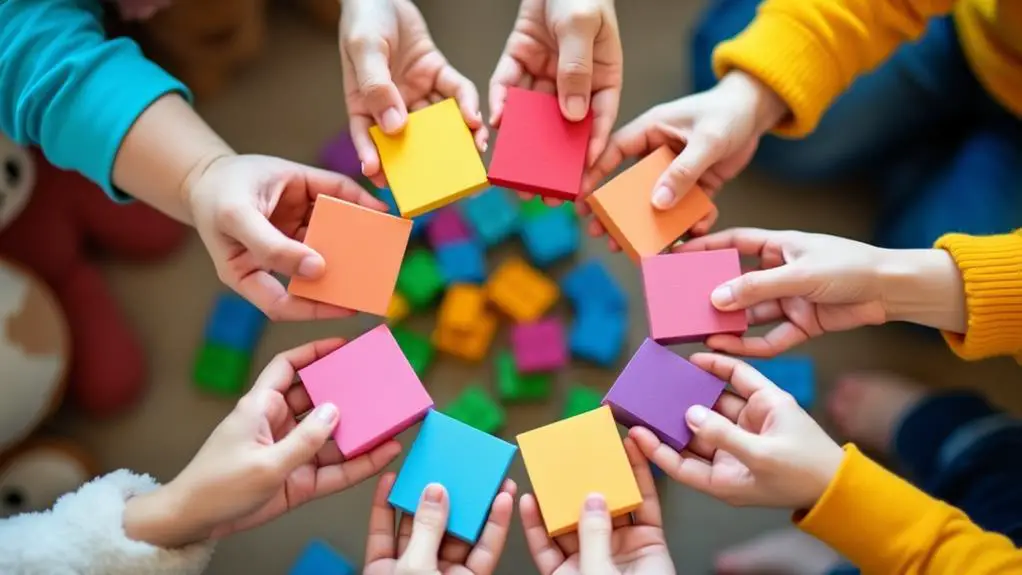Building Emotional Intelligence in Kids
As I reflect on the importance of emotional intelligence in children, I'm struck by how essential it is for their future success and well-being. I've seen firsthand how kids who can understand and manage their emotions tend to thrive in social situations and academics alike. But building these skills isn't always straightforward. There's a delicate balance between nurturing emotional awareness and avoiding overprotection. I've often wondered: how can we, as adults, best support children in developing their emotional intelligence without stifling their natural growth? The answer, I've found, lies in a combination of strategies that might surprise you.
Key Takeaways
- Encourage self-awareness by helping children recognize and name their emotions.
- Model and teach effective self-regulation techniques for managing feelings and stress.
- Foster empathy through storytelling, role-playing, and discussing others' perspectives.
- Promote social skills development with cooperative play and group activities.
- Create a safe environment for emotional expression and integrate EI lessons into daily routines.
Understanding Emotional Intelligence Components
In light of the growing recognition of emotional intelligence's importance, it's vital to understand its core components. As I help children develop their emotional intelligence, I focus on four key areas: self-awareness, self-regulation, empathy, and social skills.
Self-awareness is the foundation, teaching kids to recognize their own emotions and how they affect their behavior. I then guide them in self-regulation, helping them manage and control their feelings effectively.
Empathy is essential for children to understand and connect with others' emotions, fostering compassion and stronger relationships. Finally, I work on enhancing their social skills, which are crucial for maneuvering complex interpersonal situations.
Strategies for Fostering EI Skills
Developing emotional intelligence skills in children requires deliberate and consistent effort. As a parent or educator, I've found that integrating emotional vocabulary into daily conversations helps children express their emotions more effectively.
By modeling emotional regulation, I'm teaching them valuable life skills for managing stress and challenges.
To foster social and emotional development, I engage kids in cooperative play and team activities. This approach enhances their empathy and collaboration skills.
I also use storytelling and role-playing to help children practice understanding different perspectives.
Here are three key strategies I've found effective in helping develop emotional intelligence:
- Encourage open discussions about feelings
- Implement mindfulness practices for self-awareness
- Utilize storytelling to reinforce empathy
Age-Appropriate EI Activities

As children grow up, emotional intelligence activities must keep pace with their developmental stages. I've found that preschoolers benefit from simple emotion identification games using cards to help your child develop their emotional vocabulary.
For early elementary students, I recommend storytelling to illustrate emotional concepts and enhance empathy. Cooperative group activities, like team sports or arts and crafts, are excellent for promoting social skills and emotional awareness.
I've seen great results with role-playing scenarios, where kids act out different emotional situations to understand and express feelings better. For older children, I suggest incorporating board games that involve emotional decision-making, encouraging critical thinking about emotions and behavior.
Overcoming EI Development Challenges
Overcoming challenges in emotional intelligence development requires a nuanced approach. As I help children learn about feelings and emotions, I've found that cultural differences and varying levels of emotional awareness can complicate the process.
To address these challenges, I focus on:
- Creating a safe environment for emotional expression
- Tailoring activities to meet individual needs
- Continuously improving my skills through professional development
It's essential to respond to children's unique backgrounds and comfort levels when discussing emotions. I've learned that some kids may resist opening up, so I endeavor to create a supportive atmosphere where they feel secure.
As a trained educator, I'm committed to helping your child develop emotional intelligence while balancing academic demands. By integrating EI lessons seamlessly into daily activities, I can overcome the challenges of time constraints and cultural differences.
Conclusion
I've learned that building emotional intelligence in kids is essential for their success. By focusing on self-awareness, self-regulation, empathy, and social skills, I'm helping children understand and manage their emotions better. I've found that storytelling, cooperative play, and role-playing are effective tools. I'm committed to creating a safe space for emotional expression and integrating EI activities into daily routines. It's challenging, but I'm confident these efforts will foster resilient, emotionally intelligent children.







